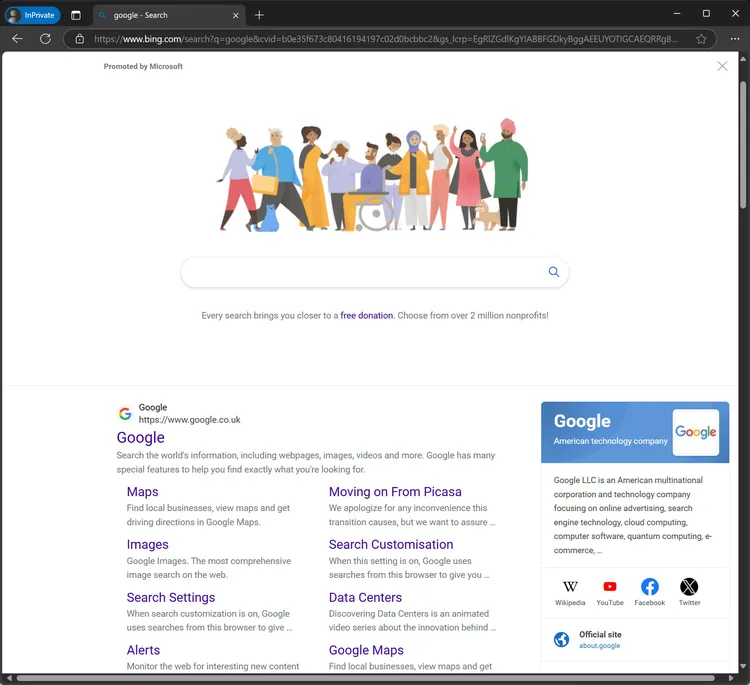Microsoft has quietly killed off its spoofed Google search UI that appeared on Bing in early January.
Microsoft has silently put an end to its controversial attempt to mimic Google’s user interface within Bing search results. Earlier this month, users who searched for “Google” on Bing encountered an uncanny replica of the Google homepage, complete with a search bar styled like Google’s, a playful image resembling a Google Doodle, and a small text snippet beneath the search bar mimicking the authentic Google search page.
This eyebrow-raising move by Microsoft caught widespread attention after Reddit users exposed the spoof. The mimicry went so far as to include an auto-scrolling feature that subtly concealed Bing’s own search bar at the top of the page. The intention was clear: to create the illusion that users had somehow landed on Google’s website while still using Bing. The deceptive tactic raised eyebrows and fueled discussions about Microsoft’s aggressive push to retain users on its platforms.
The End of the Spoof
Fast forward a few days, and the misleading UI has now vanished. The spoofed Google interface no longer appears when searching for “Google” on Bing. This sudden disappearance came just as the controversy was beginning to gain traction online. While Microsoft has refrained from commenting on the situation, the incident hasn’t escaped scrutiny.

Google’s Response
Google, unsurprisingly, didn’t hold back. Parisa Tabriz, head of Google Chrome, shared her thoughts on X (formerly Twitter), taking a direct shot at Microsoft. “Imitation is the sincerest form of flattery, but Microsoft spoofing the Google homepage is another tactic in its long history of tricks to confuse users & limit choice,” she said. “New year; new low Microsoft.”
Tabriz’s critique underscores a larger narrative of rivalry between the two tech giants, where the battle for dominance in search and browser markets has often escalated beyond conventional competition.
A History of Dubious Tactics
This isn’t the first time Microsoft has come under fire for employing questionable tactics to promote Bing and its Edge browser. The company has consistently pushed users toward its ecosystem by leveraging its control over Windows. Examples include:
- Chrome Download Modifications: Users attempting to download Google Chrome from Edge have been met with messages discouraging the download or highlighting Edge’s supposed superiority.
- Malware-Like Popups: Persistent popups within Windows and Edge have urged users to stick with Bing, often interrupting workflows.
- Ad Popups in Competitor Browsers: Microsoft has, in the past, displayed ads within Google Chrome to promote Edge—a move that drew widespread criticism for its invasive nature.
These tactics have led to complaints from users and competitors alike, with critics accusing Microsoft of leveraging anti-competitive practices to trap users within its ecosystem.
Why It Matters
Search engines play a crucial role in shaping the online experience. Google, with its dominant market share, has long been the default choice for millions. Bing, despite being a distant second, has made significant strides in recent years, especially with its integration of AI-driven features through partnerships with OpenAI. However, stunts like the recent Google UI spoof risk undermining the credibility of Microsoft’s efforts to position Bing as a legitimate alternative.
Deceptive practices not only erode trust but also detract from the genuine advancements Microsoft has made in improving Bing’s capabilities. As users become more discerning, authenticity and transparency will be critical for any search engine aiming to compete with Google’s entrenched dominance.
What’s Next for Microsoft?
While Microsoft’s intentions with the spoofed UI remain unclear, the backlash serves as a reminder that even tech giants are not immune to scrutiny. Moving forward, the company will need to tread carefully to rebuild trust and demonstrate that Bing can stand on its own merits rather than relying on gimmicks.
At the same time, Google’s pointed response highlights the fierce competition in the search engine and browser markets. Both companies will likely continue to innovate and push boundaries, but the real winners will be users if this rivalry leads to better products and experiences.
For now, the disappearance of the fake Google interface is a small but significant victory for those advocating for fair competition and transparency in tech. Only time will tell if Microsoft’s next move aligns more closely with these principles.










